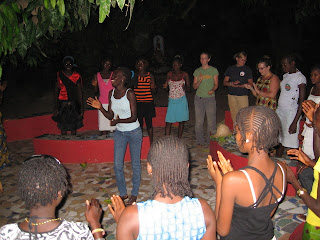I know I write about gender issues a lot; it’s because they’re often in the forefront of my mind here. It’s been a while though, so I think I’m about due for another one. Here goes:
Today I had a very interesting conversation with a male counterpart (why do so many of my blog posts seem to start that way??) about “working women” in the Gambia, i.e., women who work outside the home bringing in money. He explained that working women here usually give a large portion (1/2 to 2/3) of their earnings, either in cash or in kind, to their biological families. It generally goes to their parents but sometimes it goes to siblings or extended family. However, if she is married, even though she is bringing in money, there is still a very strong cultural expectation that her husband will support her and their children by paying all their everyday expenses. This has two direct consequences:
1) Men often do not like to marry working women (at least as their first wives) because working women's household work suffers compared to women who don't work and the men see very little, if any of the money she makes. Remember, without things like dishwashers, washing machines, microwaves, running water, etc, maintaining a household here takes a LOT more time and effort than in the US.
2) In many cultures, there is significant preference for sons over daughters because daughters have to be married off (which sometimes involves paying a dowry) and never give much back to their biological families once they're married. Here, not only do daughters shoulder a huge amount of household work (sweeping, fetching water, doing laundry, etc), but parents know that if she ends up working when she is grown, she will support them financially. My counterpart insisted that this is happening, daughters are supporting their families, and even cited daughters paying to send their fathers on pilgrimage to Mecca. Talk about a role reversal! Not surprisingly, son preference is not as deeply ingrained here as it is in many other cultures.
This again raised the related issue of the intense financial strain on "working men," i.e., men who are bringing in money. Very often, the man who goes out and get a good job instead of sitting back and waiting for aid dollars or a free ticket to America is faced with outstretched hands and deeply ingrained dependency everywhere he turns; his wife/wives, his children, his parents, his extended family, even his lazy friends who know they can get by just fine without having to work all look to him for financial support. They all are pulling these men down, making it virtually impossible for them to save or invest in their future (such as going back to school) in a way that would give them a chance to break out of the cycle of poverty.
That said, on the flip side, the social safety net of those who have supporting those who don't is what supports the elderly, ensures sick and disabled people and orphans are cared for, keeps a roof over people's heads and food in their bellies when they have a bad harvest or their house burns down, pays the school fees of countless children and provides housing when their school is far from home, and countless other social services that the government does not provide here. This is a desperately poor country, and yet, people aren't starving and there are no homeless people on the streets. Why? Because people here share everything and everyone is constantly helping each other. To a fault. Good or bad? You tell me.








































